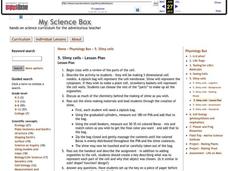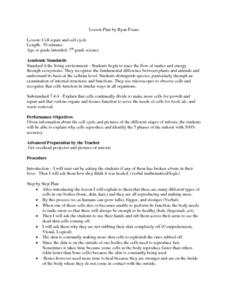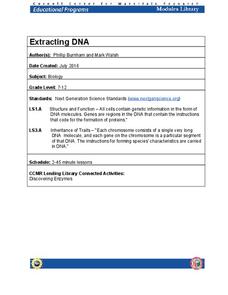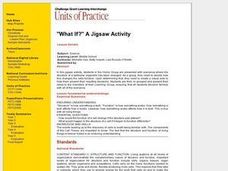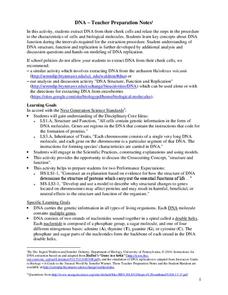Curated OER
The Giant Cell
After actively participating in a unit on cells, the students act out and become the organelles. They will act out and explain the functions of what each of the organelles do for the cell.
Curated OER
Slimy cells
Students study the parts of a cell. For this chemistry lesson students complete an activity in which they make as much slime as they want.
Curated OER
Cells, The Structural and Functional Units of Life
Students observe the general structure and organelles of plant and animal cells. Students prepare microscope slides of elodea, onion, check, and cork and identify the cells by size and shape as unicellular, multicellular, plant or animal.
Curated OER
Plant And Animal Cells
Students identify parts of plant and animal cells and describe the functions of each part. They distinguish between plant and animal cells. After a lecture/demo, students perform experiments which help them construct models of plant and...
Curated OER
Spotlight on Photovoltaics and Fuel Cells
Young scholars utilize Internet resources to uncover the pros and cons of two topics in alternative energy technology: photovoltaics and fuel cells. Students analyze the structure and function of each system to make observations about...
Curated OER
Cell Repair and Cell Cycle
Seventh graders explore the cell cycle. They view pictures of different stages of mitosis and explain why cells reproduce. They identify the five phases of mitosis: interphase, prophase, metaphase, anaphase, and telophase.
Curated OER
Cells
Students are introduced to the life cycle of a cell. In groups, they identify and describe the function of organelles. They compare and contrast the differences and similarities between plant and animal cells as well. They complete a...
Curated OER
Study of the Cell
Students draw a diagram to show the fluid mosaic model of a membrane. They explain how hydrophobic and hydrophilic properties help membranes hold their shape. They identify the functions of different cell membrane proteins as well.
Curated OER
Discovering the Structure of the Atom
Pupils investigate atomic and nuclear structure of matter by researching historical atomic theories. Students examine Rutherford's studies and discover that many scientific conclusions change over time as new data is collected.
Biology Junction
Introduction to Biology
Welcome to Biology! Introduce pupils to a subject conceptualized by Aristotle in 300 BC through a presentation and worksheet. It covers the themes of biology, characteristics of life, the scientific method, microscopes, and measurements.
Cornell University
Extracting DNA
Uncover the basics of DNA structure through exploration activities. Collaborative groups build DNA models and recreate the process of replication. Then, using plant cells such as peas or strawberries, they extract a DNA sample.
Curated OER
Plasmolysis in Elodea Plant Cells
Students microscopically observe various subcellular components. They determine the effects of different salt solutions on Elodea plant cells. Students explain the major function of a cell membrane and describe its structure.
Curated OER
Connective Tissue Matrix
In this connective tissue worksheet, students are given a diagram of connective tissue and they color the major components of the tissue a particular color. They match each structure in the diagram to its function.
Curated OER
The Living Environment
Sixth graders show what they know about plant and animal cells. In this cell project lesson plan, 6th graders get to choose a project based on their learning style. They can create a visual representation of cells, auditory forms, or...
Curated OER
Onion Skins
Students explore the structure of a plant cell. They carefully peel a single layer of onion skin from a slice of onion and stain it with methylene blue to observe the structures inside. They use a Digiscope connected to a computer to...
Curated OER
How Genes Work Lesson Plan
High schoolers define the key terms that are the structure and function of DNA. In this genetics lesson students complete a lab activity in which they construct a model DNA structure.
Curated OER
Plant Structure and Function
With a few minor formatting changes, the plant parts and processes resource here would make a great study guide, quiz, or self assessment. Currently, it is a bit confusing, but changing some lettering to numbering would clear up any...
Curated OER
Nervous System
Are you nervous about teaching the nervous system to your beginning biologists? Worry no more! This PowerPoint provides a note-taking guide and diagrams of the neuron and the brain. Viewers will walk away with a clear...
Virginia Department of Education
The Ratio of Surface Area to Volume
Demonstrate the ratio of surface area to volume in your high school class by using phenolphthalein, gelatin, and an onion. Intrigue the class by leading a discussion on osmosis and diffusion, then making "scientific jello." Participants...
Curated OER
"What If?" A Jigsaw Activity
Students, in groups, consider a scenario in which some structure of a cell has been changed. They explore how structural change affects the function of a cell and create a visual aid to illustrate their observations.
Curated OER
Extracting DNA from Your Cells - Teacher Preparation Notes
Students extract their own DNA from cheek cells. In this biology instructional activity, students explain the replication process. They identify the structure and composition of DNA.
Curated OER
Basic Units of Life
In this cells worksheet, learners will review vocabulary words and information relating to the structure and function of plant and animal cells. This worksheet has 10 crossword puzzle questions, 6 multiple choice, 4 short answer...
Curated OER
Fighting Infection
Students study immune responses and the structures that are related to immune cells functions. In this fighting infection lesson students construct antibody complexes and model the interaction of the immune system when it is...
Curated OER
The Characteristics of Living Things
Eighth graders explore the characteristics of living things. In this living things lesson plan, 8th graders review as a class the cell theory and the characteristics of living things. They answer questions about how to determine if...



